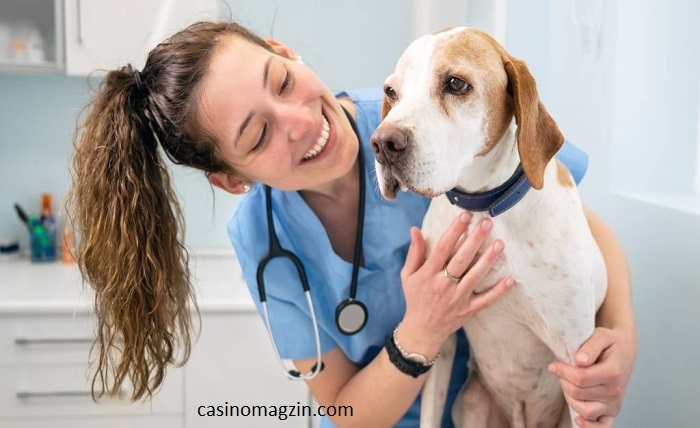Guide to Caring for Your Pet

Having a pet might be among life’s most fulfilling endeavors. Our animal pals offer us unwavering affection, psychological assistance, and continuous company. Pets, however, come with a lot of responsibility and need to be properly cared for. Providing food, grooming, medical attention, exercise, affection, and safety are all part of proper pet care. You can guarantee your pet has a happy and healthy life by being aware of their needs and adhering to certain fundamental rules. Everything you need to know about providing your pet with the best care is covered in this comprehensive handbook.
Proper Nutrition:
One of the most important aspects of pet care is providing proper nutrition. The type of food, amount, and feeding schedule will vary based on factors like your pet’s species, breed, age, activity level, and specific dietary needs. Consult with your veterinarian to determine the ideal diet for your pet. Make sure to feed them high-quality, brand-name pet food and avoid generic or store brands which may lack essential nutrients. Cats and dogs should be fed species-appropriate food formulated for their life stage. Fresh water should always be available and changed daily. Follow feeding guidelines based on your pet’s weight and activity level.
Grooming and Hygiene:
Regular grooming and bathing are essential for your pet’s health and hygiene. Brush or comb your pet often to remove loose hair and distribute skin oils. Trim their nails every few weeks to prevent overgrowth and injury. Clean inside and around their ears gently. Brush their teeth frequently to reduce plaque and prevent periodontal disease. Bathe your pet as needed using gentle, pet-safe shampoos. Always use positive reinforcement and treats so grooming is a pleasant experience. Proper hygiene prevents skin issues, parasites, and infections.
Health Care and Veterinary Visits:
You should establish a relationship with a trusted veterinarian and schedule regular wellness exams. Annual vet visits allow early detection of health problems through physical exams, diagnostic testing, and vaccination boosters. Puppies and kittens require a series of vaccinations for protection against dangerous diseases. Parasite prevention through medications like flea/tick/heartworm prevention is generally needed monthly. Spaying or neutering your pet provides major health benefits. Immediately contact your vet if your pet displays any unusual symptoms like appetite changes, lethargy, limping, or gastrointestinal issues. Preventive and prompt medical care keeps your pet healthy.
Daily Exercise and Play:
Pets need daily exercise and play for both physical and mental stimulation. The type and amount varies based on species, breed, age, and health status. Dogs need substantial outdoor exercise like walks, runs, swimming, or fetch. Cats benefit from indoor play and exploration. Interactive toys provide mental engagement. Create a safe, enclosed space for them to roam and play. Watch for signs of fatigue or overexertion. Proper exercise prevents obesity, joint issues, and boredom-related behavior problems. An enriched environment enhances overall wellbeing.
Affection, Attention, and Safety:
Quality time together nurtures the human-animal bond. Pets thrive on daily affection and attention from their owners. Grooming, play, cuddling, and talking to your pet are great ways to provide emotional enrichment. Always treat pets gently and positively. Ensure your home is safe by removing hazards, restricting access to dangerous areas, and properly supervising interactions with children or other pets. Never yell at or physically punish your pet. Provide access to fresh water, shade/cool spots, and shelter at all times. Meeting your pet’s needs for love and safety is key for mutual happiness.
By following these pet care guidelines, you can keep your furry friend healthy, happy, and safe. Proper nutrition, grooming, vet care, exercise, affection, and safety will lead to years of joy with your beloved companion animal. With some education and effort, you can become the best possible pet owner.
Conclusion:
Giving your pet the care they need is crucial because it fosters a tight bond between you and your pet. Pet owners may provide their furry buddy a happy and healthy life by feeding them a balanced diet, grooming them on a regular basis, arranging veterinary checkups, giving them daily play and exercise, showing them attention, and making sure they are safe. Learn about the demands of your particular pet by doing research. Establish a care regimen to reliably address such needs. You are your pet’s primary source of health and wellness. You can feel comfortable taking care of your cherished pet if you have the appropriate information and tools.
Frequently Asked Questions:
Q: How often should I feed my pet?
A: Feeding frequency depends on your pet’s species, breed, age, and activity level. Follow your vet’s recommendations and feeding guidelines on the pet food package. Puppies and kittens need to eat more frequently than adult pets.
Q: What is the best way to groom my pet?
A: Brush or comb your pet regularly to remove loose hair and distribute skin oils. Trim nails every few weeks. Clean inside and around ears gently. Brush teeth frequently. Bathe as needed with gentle shampoo. Make grooming pleasant with positive reinforcement.
Q: How can I keep my pet entertained?
A: Provide interactive toys, daily exercise and playtime, access to safe exploration areas, a variety of surfaces like cat towers, and affection. An enriched environment prevents boredom and behavior issues.
Q: What signs of illness should I look out for?
A: Appetite/thirst changes, lethargy, limping, gastrointestinal issues, skin problems, parasites, unusual growths or lumps, dental issues, coughing, sneezing, wheezing, and other abnormal symptoms warrant a vet visit.
Q: How can I pet proof my home?
A: Remove poisonous houseplants. Keep medications, toxins, and cleaning products locked away. Secure loose wires. Place barriers around unsafe areas like balconies or pools. Restrict access to kitchen and bathrooms. Provide designated safe chew toys. Supervise interactions with children.





